
Maurice Papon was a French civil servant and Nazi collaborator who was convicted of crimes against humanity committed during the occupation of France. Papon led the police in major prefectures from the 1930s to the 1960s, before he became a Gaullist politician. When he was secretary general for the police in Bordeaux during World War II, he participated in the deportation of more than 1,600 Jews. He is also known for his activities in the Algerian War (1954–1962), during which he tortured insurgent prisoners as prefect of the Constantinois department, and ordered, as prefect of the Paris police, the 1961 massacre of pro-National Liberation Front (FLN) demonstrators for violating a curfew that he had "advised".
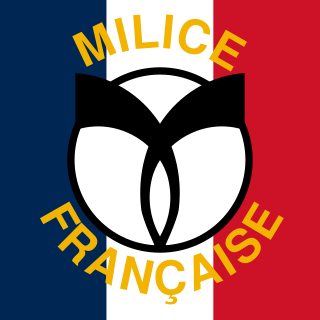
The Milice française, generally called la Milice, was a political paramilitary organization created on 30 January 1943 by the Vichy régime to help fight against the French Resistance during World War II. The Milice's formal head was Vichy France's Prime Minister Pierre Laval, although its chief of operations and de facto leader was Secretary General Joseph Darnand. The Milice participated in summary executions and assassinations, helping to round up Jews and résistants in France for deportation. It was the successor to Darnand's Service d'ordre légionnaire (SOL) militia. The Milice was the Vichy régime's most extreme manifestation of fascism. Ultimately, Darnand envisaged the Milice as a fascist single-party political movement for the French State.

The Statement is a 2003 drama thriller film directed and produced by Norman Jewison, from a screenplay by Ronald Harwood, based on the 1996 novel by Brian Moore. It stars Michael Caine, Tilda Swinton, Jeremy Northam, Alan Bates, William Hutt, John Neville and Charlotte Rampling.

Serge Klarsfeld is a Romanian-born French activist and Nazi hunter known for documenting the Holocaust in order to establish the record and to enable the prosecution of war criminals. Since the 1960s, he has made notable efforts to commemorate the Jewish victims of German-occupied France and has been a supporter of Israel.

Count Jacques Charles Noel Dugé de Bernonville was a French collaborationist and senior police officer in the Milice of the Vichy regime in France. He was known to hunt down and execute resistance fighters during World War II, as well as for his participation in antisemitic programs, including the deportation of French Jews to Drancy and extermination camps. After his escape from France, he was convicted in absentia of war crimes and sentenced to death.

Georges Mandel was a French Jewish journalist, and politician.
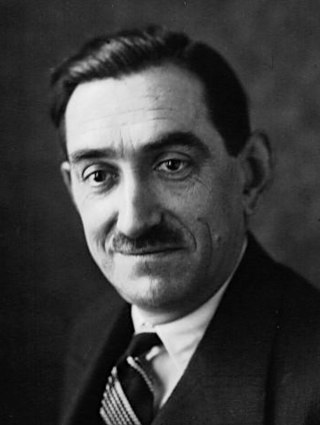
Philippe Henriot was a French poet, journalist, politician, and Nazi collaborator who served as a minister in the French government at Vichy, where he directed propaganda broadcasts. He was assassinated by the Résistance in 1944.

The Vel' d'Hiv' Roundup was a mass arrest of Jewish families in Paris on 16–17 July 1942 by French police and gendarmes at the behest of the German authorities. The roundup was one of several aimed at eradicating the Jewish population in France, in both the occupied zone and the free zone, that took place in 1942 as part of Opération Vent printanier. Planned by René Bousquet, Louis Darquier de Pellepoix, Theodor Dannecker and Helmut Knochen, it was the largest deportation of Jews from France.

Basch Viktor Vilém, or Victor-Guillaume Basch was a French Jewish politician and professor of germanistics and philosophy at the Sorbonne descending from Hungary. He was engaged in the Zionist movement, in the Ligue des droits de l'homme and in Anti-Nazism.
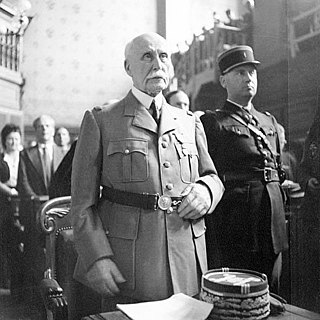
The épuration légale was the wave of official trials that followed the Liberation of France and the fall of the Vichy regime. The trials were largely conducted from 1944 to 1949, with subsequent legal action continuing for decades afterward.

René Bousquet was a high-ranking French political appointee who served as secretary general to the Vichy French police from May 1942 to 31 December 1943. For personal heroism, he had become a protégé of prominent officials before the war and had risen rapidly in the government.
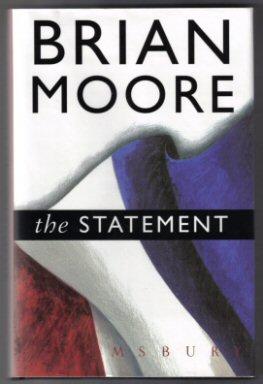
The Statement (1995) is a thriller novel by Northern Irish-Canadian writer Brian Moore. Set in the south of France and Paris in the early 1990s, The Statement is the tale of Pierre Brossard, a former officer in the pro-fascist militia that served Vichy France and a murderer of Jews. The novel was published by Bloomsbury in the United Kingdom in 1995 and by E.P. Dutton in the United States on 1 June 1996.
Abraham Salomon Glück was a French physician and a member of the French Resistance.
Philippe Laguérie is a French Traditionalist Catholic priest. He was the first Superior General of the Institute of the Good Shepherd, which upholds the Tridentine Mass.

Vichy France, officially the French State, was the French rump state headed by Marshal Philippe Pétain during World War II. It was named after its seat of government, the city of Vichy. Officially independent, but with half of its territory occupied under the harsh terms of the 1940 armistice with Nazi Germany, it adopted a policy of collaboration. Though Paris was nominally its capital, the government established itself in the resort town of Vichy in the unoccupied "free zone", where it remained responsible for the civil administration of France as well as its colonies. The occupation of France by Nazi Germany at first affected only the northern and western portions of the country, but in November 1942 the Germans and Italians occupied the remainder of Metropolitan France, ending any pretence of independence by the Vichy government.
There have been several controversies surrounding the Society of St. Pius X, many of which concern political support for non-democratic regimes, alleged antisemitism, and the occupation of church buildings. The Society of St. Pius X is an international organisation founded in 1970 by the French traditionalist Catholic archbishop Marcel Lefebvre.
The Fédération nationale des déportés et internés résistants et patriotes is an organization founded by Marcel Paul and Henri Manhès in October 1945, five months after the defeat of Nazi Germany at the end of World War II. The Federation carries on the legacy of those who perished in Nazi concentration camps or were interned in prisons in occupied France and unites survivors of the camps, prisons and the French Resistance. The federation also researches and exposes the war crimes of Nazism.
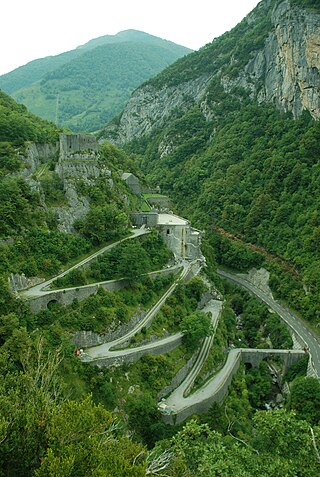
The Fort du Portalet is a fort in the Aspe Valley in Bearn, French Pyrenees, built from 1842 to 1870.
Georges Glaeser was a French mathematician who was director of the IREM of Strasbourg. He worked in analysis and mathematical education and introduced Glaeser's composition theorem and Glaeser's continuity theorem. Glaeser was a Ph.D. student of Laurent Schwartz.
"Résistancialisme" is a neologism coined by historian Henry Rousso to describe exaggerated historical memory of the French Resistance during World War II. In particular, résistancialisme refers to exaggerated beliefs about the size and importance of the resistance and anti-German sentiment in German-occupied France in post-war French thinking.













